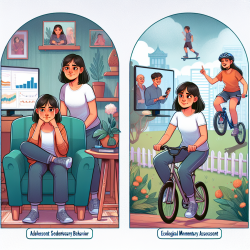For practitioners in the field of special education and online therapy, staying updated with the latest research is crucial for improving therapeutic outcomes. A recent study titled "In Vivo Reversal of P-Glycoprotein-Mediated Drug Resistance in a Breast Cancer Xenograft and in Leukemia Models Using a Novel, Potent, and Nontoxic Epicatechin EC31" offers valuable insights that can be applied in therapeutic practices. This blog will explore the key findings of this study and how practitioners can leverage this information to enhance their skills and encourage further research.
Understanding the Research
The study focuses on reversing multidrug resistance (MDR) in cancer, a significant challenge in chemotherapy. MDR is often caused by the overexpression of P-glycoprotein (P-gp), a protein that pumps drugs out of cancer cells, reducing their efficacy. The researchers identified a novel compound, Epicatechin EC31, which effectively inhibits P-gp, thereby increasing the intracellular concentration of chemotherapeutic drugs and enhancing their effectiveness.
Key Findings
- Epicatechin EC31 is a potent and nontoxic P-gp inhibitor.
- It significantly increases the intracellular concentration of drugs like paclitaxel, doxorubicin, and vincristine in P-gp-overexpressing cell lines.
- In vivo studies demonstrated that EC31 could reverse drug resistance and inhibit tumor growth in breast cancer and leukemia models.
- EC31 does not inhibit P-gp ATPase activity or affect the pharmacokinetic profile of coadministered drugs.
Practical Implications for Therapists
For therapists working with clients undergoing cancer treatment, understanding the mechanisms of drug resistance and the potential of compounds like EC31 can be invaluable. Here are some ways to apply this knowledge:
- Educational Support: Educate clients and their families about the importance of ongoing research in overcoming drug resistance.
- Collaborative Care: Work closely with oncologists and other healthcare providers to stay informed about new treatments and their potential benefits.
- Advocacy: Advocate for the inclusion of cutting-edge research in treatment plans to ensure clients receive the most effective therapies.
Encouraging Further Research
While the findings of this study are promising, further research is needed to fully understand the potential of EC31 in clinical settings. Practitioners can contribute to this effort by:
- Participating in Research: Engage in or support clinical trials and studies that explore new treatments for drug-resistant cancers.
- Sharing Knowledge: Disseminate research findings within professional networks to raise awareness and encourage collaborative efforts.
- Continuing Education: Pursue ongoing education opportunities to stay updated with the latest advancements in cancer therapy.
To read the original research paper, please follow this link: In Vivo Reversal of P-Glycoprotein-Mediated Drug Resistance in a Breast Cancer Xenograft and in Leukemia Models Using a Novel, Potent, and Nontoxic Epicatechin EC31.










